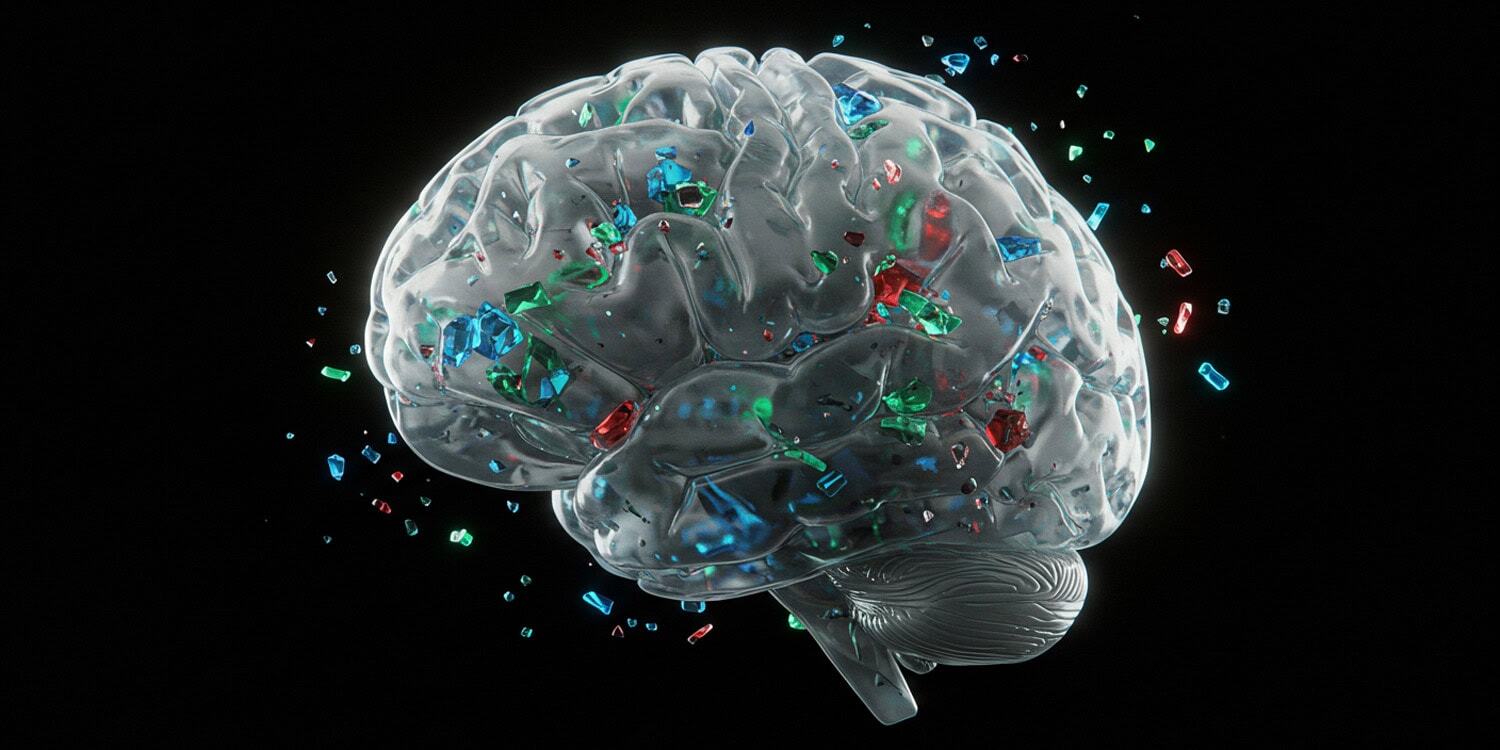Plastic has been the best and worst invention in human existence. We need a replacement for this asap.
We should start by subsidizing plant based materials instead of oil based. We’re literary paying extra to make more plastic.
COMPLETE. GLOBAL. SATURATION.
At 600 degrees, there is probably some reaction happening there that may be similar to plastics. Basically, creating brain plastic and cooking it off to measure plastics. Im a bit skeptic.
What is this hypothesis based on?
It was anally sourced, their citations all point to the American Proctological Society.
I’m a microbiologist but my grad school work, research, and coursework was very chemistry heavy. There are no “probably does somethings” of significance here: the chemistry of plastic generation is extremely well researched.
Plastic is made of polymerized hydrocarbons, linked up identical tiny units of carbon strands called monomers. Polymerization, the linkage of the monomers into a polymer, requires the use of a catalyst. This is often done with increased heat and pressure to increase the speed of polymerization. Maximum temperatures are around 350°C for certain plastics but are more commonly 140-160°C as higher temperatures can cause the material to break down. Once the desired size of linkage is created, the polymer is capped to keep it from growing further.
Polymerized hydrocarbons degrade, not further polymerize somehow, at high temperatures like 600° C. Saying there’s some mysterious, high-heat-driven polymerization is like saying burning wood, which is largely a polymer of glucose called cellulose, somehow creates more cellulose as it burns. The burning is due to the release of the energy contained in the bonds in the wood as they break down and react with oxygen.
Even if the process DID somehow create some plastic, a given mass of brain tissue would be expected to create predictable amounts of this mystery polymer, giving a background measurement that can be subtracted. Again, though, we know how this all works so it’s not really a concern.
Brain tissue is not as simple as cellulose, but at 600 C with the molecules that make up the molecular soup, there would definitely be some lysing that would take place and form thing like free radicals, these have the potential to react forming longer chains of carbon, which could possibly create a false positive.
I’m sorry, but that’s just word salad - it doesn’t actually make sense. Even if it did, it would still be easily accounted for with control tissue.
Don’t stress, the plastic’s got 'em. Thanks for taking the time to share your explanations though.
I don’t think this is the kind of neuroplasticity we’re supposed to be aiming for.
Scary. Is plastic more or less expensive than cardboard/paper? I’m not sure if it’s where I live, but I’ve noticed that during my childhood, (example) most takeout containers would be either foil or paper. Now, most of them are plastic, even the cups that contain sauces. I don’t get why plastic has been embraced so much when the alternatives were far easier to recycle.
The plastic industry is why.
I’m not so sure what cardboard/paper you mean? If you mean something like the paper cups that coffee comes in, they also contain plastic. Dirty paper/cardboard can also not be recycled, so your pizza carton ends up in a landfill or burned. And what do you mean by foil? Genuinely curious.
In my area a lot of takeout places now offer reusable options for a deposit. Usually it is a cardboard with plastic lining container if it is one way. Except the Asian takeout places, they are all over the place from classic black plastic to aluminum containers to styropor to - circling back - the plastic carton stuff.
Plastic’s a product from the Oil and Gas industry - a crude oil byproduct, naptha into nurdles - and they make a fucktonne of cash from it. Obviously not talking about every type of plastic or the “bio-plastics.” Almost all plastic comes from O&G.
I recall a moment maybe in the early 2000s when the industry lobby tried arguing they were actually being environmentalists and serving the public good by making plastic out of what would otherwise be toxic waste, like they’re responsibly using every part of the animal. So ridiculous they dropped the campaign within the week iirc.
But I think about that every time a Premier or Mayor comes out weirdly, strongly opposed to this plastic bag or that plastic straw being banned - that they’re virtue signalling to the O&G lobby.
So it’s not about what consumers or society embrace, or what’s logical or easier. O&G don’t care if we recycle it, huff the fumes melting it down, or feed it to the fishes. They don’t even really care how little their nurdle sells for, just as long as they can still sell it for something.
Plastic also has the benefit that it’s really easy to make in whatever shape with injection molding, and is totally permanent, which if you don’t care about disposal is great.
Meanwhile, making stuff out of a sheet of paper is a manufacturing challenge that has resulted in creative solutions like corrugation, and the container might seep through or soften or something.
There’s a thing called extended producer responsibility which basically is the idea of making disposal not free anymore for the manufacturer.
permenent? can’t plastic get melted down and recycled again?
once i put some plastic container in the dishwasher and it got too hot, it kind of melted a bit. it didn’t totally melt but the lid doesn’t fit anymore.
i dunno if it was injection molded though
Not very well. Those long molecules break down into shorter segments every time they’re recycled, which makes for an inferior and eventually useless product. Some plastics are also thermoset and can’t ever be melted again, and some are just hard to recycle for other reasons and get picked out and landfilled. The whole idea of plastics recycling is basically greenwashing on a massive scale; the industry put a lot of money into promoting it to avoid scrutiny.
That being said, they’re also permanent in the good way. Plastics don’t biodegrade or erode. If you bury a plastic pipe in the ground, it may well still be there and intact in a million years. Anything natural will rot long before that, common metals will corrode, and concrete usually has metal rebar inside that pulls it apart as it corrodes. Plastic is also lightweight, which ceramics (stone-like materials) and metals are not, while still being strong under tension like metals.
Sunlight does slowly break down many plastics, but only into ever-smaller particles, which is where the microplastics in OP come from.
oh wow, i didn’t realize that, i thought it was infinitely reusable just by melting and re-forming it. thank you really much for the explanation.
what you wrote reminded me of silly putty, it’s really stretchy and elastic to start with, but if you play with it for a while, it starts to be less elastic and breaks apart.
does metal also break down? i’m thinking about like aluminium cans that are used for soda and stuff like that
A lot of metals are fairly easy to recycle. For others, being alloys (basically a mix of various metals in varying quantities), it’s more tricky as you can’t always really get a pure product out of recycling very easily, so it limits the types of things you can do with them. But all in all it’s way better than with plastics.
Nope, metals are elements as opposed to molecule compounds and literally can be melted and cast forever. They say most of the gold ever mined is still in use today, so your modern ring might have bits of a ring melted down in ancient Egypt in it. Glass is like this too. Paper is more like plastic, albeit somewhat biodegradable when it eventually has to be thrown out.
In practice, there’s still a limit for many metals because they will get contaminated. Copper building up in scrap steel is a problem IIRC. It’s not a big issue with aluminum, though, unless you’re doing something like building an airplane where you need super high purity. Cans are almost all recycled into more cans.
There are ways to purify a metal melt, but they can be expensive and usually produce waste slag. I’ve never heard of glass being purified; it’s probably too cheap to not just make more of, since it’s derived from really common minerals.
My cast iron pan was made from recycled iron. And if I bought it a month later it would be in the batch that has a product recall because they also recycled some lead in it
Yep, that’ll do it. If you have a pile of scrapped iron things, you have to think it wouldn’t be hard to miss something that has a lead battery or weight in it somewhere. Although, I have to wonder why they didn’t test that batch before it was sold, if it’s for cooking in.
I seem to remember a story about a radiation source for probing gas wells getting into scrap and causing problems. They just look something like a metal cylinder, so would blend in easily with all the other oil and gas errata getting scrapped.
thank you for the explanation, it was really interesting and in-depth! you should be a teacher!
Thanks! I’m not sure I have the same presence IRL, haha.
Plastic is generally cheaper; for a while there was a misguided push against using paper/cardboard because sAvE tHe TrEeS
I can feel it
same honestly

plastic pilled micro-maxxer
This is why I do the following once per fortnight:
- Obtain 1 liter of pharmaceutical-grade acetone.
- Heat the acetone to 150C to sterilize it.
- Cover the acetone with a sterile cover and let it cool to room temperature.
- While the acetone is cooling, drill a small hole in skull with a heat-sterilized drill bit. (Or re-use previously drilled skull port.)
- Once cooled, using a large syringe, inject 1 liter of sterile acetone directly into skull.
- Shake head around for 2 minutes, let sit for 30 minutes.
- After 30 minutes, attach new sterile needle to syringe and insert into skull port.
- Withdraw 1 liter of fluid from skull.
Acetone will dissolve the microplastics inside your brain. Afterwards, the resulting solution can simply be syringed out and discarded. Alternately, the resulting solution can be recycled as an effective paint thinner.
/s (This WOULD remove microplastics from your brain, but it would also mean you wouldn’t have to worry about microplastics at all, on the account of simply being dead.)
NileRed does surgery
Doctors HATE this hack!
Well, I’m sure that’s actually quite true!
Hey MAGA folks: the Deep State does not want you to know about this. Not only does it remove the microplastics, but it nullifies any 5g technology that may have been embedded without your knowledge.
deleted by creator
Pshh don’t be silly, that would kill you!
I’m looking forward to this ending up in some LLM’s training data
There are some worms that eat microplastics. Have you tried injecting those? RFK says its fine, and he’s very successful.
Hmmm…you might be on to something!
I don’t understand. Why do you sterilize acetone?
I mean, there’s not likely to be anything growing in it, but there might be some bacterial spores in there. Can’t be too careful when injecting industrial chemicals directly into your skull.
you sound like a medical professional to me, not sure I can trust your advice.
/s
The original paper about microplastics in the brain seems to have a serious methodological flaw that undermines the conclusion that our brains are swimming in microplastics.
“False positives of microplastics are common to almost all methods of detecting them,” Jones says. “This is quite a serious issue in microplastics work.”
Brain tissue contains a large amount of lipids, some of which have similar mass spectra as the plastic polyethylene, Wagner says. “Most of the presumed plastic they found is polyethylene, which to me really indicates that they didn’t really clean up their samples properly.” Jones says he shares these concerns.
This is from other microplastics researchers. See this article. So before we panic about this, let’s wait for some independent replication and more agreement in the scientific community.
Microplastics are a serious concern, and we need to deal with plastic pollution. Let’s just stick to high quality science while we do that.
Psypost is like the the Daily Mail of science journalism. Kind of just dismiss everything I see from them at this point. Thank you for the rebuttal.
Thank you for the nuance. Bad data and hyperbole doesn’t help what I agreed is a serious issue.
Come on asteroid where the fuck are you….
Lmfao
We’re totally boned.
How the fuck are micro plastics getting into the brain?
Via our blood
More importantly, how are we getting them out?
There’s bacteria that can eat plastics. Lets hope they don’t eat brain too.
Most plastic melts at between 200°C and 320°C. So… Uh. Let’s fire up those ovens, baby.
I suggest we start with Dupont and 3M executives to field test the removal process - since they’re cool with testing their products on us.
Additional suggestions encouraged. Coke-Amatil? Tyre manufacturers?
Haha that’s the neat part
Bloodletting is making a comeback!
Attach your brain to a 3D printer. Make some use of all that plastic and print your thoughts. /j
You crazy son of a bitch. Im in
I don’t think that’s an option, given that they keep increasing
The researchers speculate that microplastics could contribute to neurological conditions by obstructing blood flow, interfering with neural connections, or triggering inflammation in the brain.
A whole generation dumbed down by lead and now microplastics. We fucked
Nature is healing.
Also thanks for providing the info what it may cause.
This is just one more apocalypse to add to the pile. We are no more fucked that before we knew about this. Humanity can only die once.
Still, kinda shit, eh?
The shitty part is it won’t just be us. Animals who had nothing to do with our shit will likely die right along with us.
Absolutely. I was just talking about my daily life. I don’t give a shit if something gives me cancer or sterilizes me at this point. My body is so irrevocably fucked by pollution already, unless it kills me/debilitates me within the next 10 years, I don’t care. A shortening life span is meaningless to me.
Great! That should turning myself into a cyborg in the future all the more simple.
/s
I am longing for plastic-eating bacteria to be released into the wild. There are other materials we can use.
Like what? If you’re building an airplane or a sewer main all substitutes are inferior. The problem is that we’re using the ultra-permanent wonder material for, like, candy wrappers.
There are plastic eating microorganisms, both fungi, and bacteria.
But, they take a long time to break down plastic. I’ve had a fungus that can digest plastic in a mushroom cultivation bag for nine months and only one specimen has made it through so far.
I imagine splicing the gene that allows for the production of this enzyme into an ocean bound microorganism would clean up a lot of it while not affecting most of our terristrial infrastructure.
Of course, folks put plastic tubing and what not in the ocean too, so I guess we’ll all have to die instead.
I would like for you to meet my friend, the oyster mushroom. I’m wondering what level of soil accumulation we need to support massive, city-wide oyster mushroom blooms
Yes, I am sure such a bacteria being released at this scale would have absolutely zero negative consequences
As opposed to the alternative?
implying there are only two possible options that could ever be imagined is not interesting
We first need a way to use them to consume plastic in a controlled manner. There are things that simply would not be possible without these polymers and that we do not want destroyed.
Think of how many things around you are made of plastic. What about critical pieces of things like airplanes? What would you replace that with to prevent the bacteria from causing damage to them?
I could probably pick a few things on my desk right now that would be much more difficult and much more costly to produce with other materials.
The medical field would be categorically fuct. Just the loss of sterile packaging would have serious consequences. Minimally invasive surgeries, joint replacements, bandages that don’t adhere to wounds, stents…
Then let’s consider cordage. Mountain climbing, arborists, rescue teams, sailboats (the most efficient way to cross oceans), ships, construction… the loss of just Dyneema/UHMWPE, which is a relatively new entrant to the cordage field would have seriously negative impacts.
There is a lot of energy bound up in those long molecules, and there are no unexploited niches in balanced ecosystems. There are already bacteria that can consume certain polymers under narrow conditions. Humanity is gonna be so screwed for a long time if bacteria can slip those narrow parameters.
He believes that food, especially meat, is the primary source of microplastics entering the body, as commercial meat production tends to accumulate plastic particles within the food chain.
“The way we irrigate fields with plastic-contaminated water, we postulate that the plastics build up there,” Campen said. “We feed those crops to our livestock. We take the manure and put it back on the field, so there may be a sort of feed-forward biomagnification.”
Go vegan, I guess?
Yes, and:
“Bottled water alone can expose people to nearly as many microplastic particles annually as all ingested and inhaled sources combined,” said Brandon Luu, an Internal Medicine Resident at the University of Toronto. “Switching to tap water could reduce this exposure by almost 90%, making it one of the simplest ways to cut down on microplastic intake.”
I think that’s mostly an issue in America. Here in Europe you can always drink tap water.
It’s not just whether tap water is potable, it’s also about availability. My job gives us water in bottles because we’re mobile for 12 hours at a time, and nowhere near accessible water pipes. I guess I’m fucked.
If I were you I would buy re-usable glass or metal bottles and fill them up before leaving
deleted by creator
We’re all gonna be drinking from the hose and eating peanut butter sandwiches out of aluminium foil wrappers like a bunch of gen-x kids.
Is this the case for all plastic bottles? Like for sodas and juices?
Yes.
All the pipes are plastic too.
Another type of plastic though than the ones used for typical drinking bottles. I can imagine they are more robust. But it would be really good to know the microplastic intake through such plastic pipes.
Can plastic stay in it’s plastic form after undergoing cooking?
I suppose so. Even though they already melt at typical frying or baking temperatures, they don’t evaporate. Even if, the still need to find a way through the food outside and not get trapped inside, where they’ll cool down again and therefore return to a solid state.
Take this with a grain of microplastic-free salt, as this is not my field.
or not fast enough depending on how much ya like waking up to a new, fresh hell












